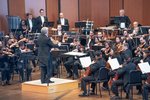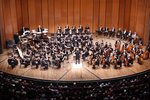


(Note: This review is based on Saturday afternoon’s dress rehearsal.)
There was a spine-chilling moment in Saturday’s Lansing Symphony concert when the entire orchestra erupted in a terrifying blast, like the Chicxulub asteroid that wiped out the dinosaurs, leaving the violins to writhe like sizzling eels at the bottom of a vaporized riverbed.
Maestro Timothy Muffitt and the musicians didn’t stick around to goggle at the eels. They had bigger fish to fry. Soon there were even bigger crashes, followed by a regenerating hydra of intertwining orchestral sections and a climactic brass chorale that bathed the crowded landscape in a blaze of silver glory.
The locomotive momentum of the 20th century, the scalding steam of chaos and grinding gears of counterpoint, drive Paul Hindemith’s “Mathis der Maler,” the centerpiece of Saturday’s concert.
Maybe the reason why “Mathis der Maler” isn’t more well known is that no filmmaker has yet given it an unforgettable movie showcase, like Richard Strauss’s “Also Sprach Zarathustra” got in “2001: A Space Odyssey.” If that ever happens, watch out.
Muffitt made the strongest case possible for “Mathis der Maler” Saturday. He massaged every erg of energy from Hindemith’s fussier exhibitions of craft and spun each cool, contrapuntal spiral to life with the warm breath of loving attention.
The musicians cloaked the evening opener, Ottorino Respighi’s “Ancient Airs and Dances,” in a purple, velvety beauty, especially when principal oboist Stephanie Shapiro and English horn player Gretchen Morse were leading the tour of the catacombs. Principal cellist Sandro Sidamonidze made time stand still with a low, warm flame of flickering melody. The combination of a modern orchestra, with all the colors at its disposal, with ancient drones and melodies, set a drifting and restless tone, a feeling of everything everywhere all at once, that permeated all the music on the program. “Mathis der Maler,” a 20th-century portrait of a Renaissance painter, evoked glass towers and stone arches, suspension bridges and castle turrets, thrusting upward together in some time-warping co-existence.
Soloists are nice to include in an orchestral concert, of course, but it was a delight to watch the maestro and the orchestra untie a big, wet cluster of knotted themes without the distractions of a star soloist.
Amid the sonic splendor, you’d never know that Saturday’s concert was a major teaching moment for Muffitt. Despite the preparation and thought that went into the program, the music came vividly alive, billowing and breaking like mysterious weather from one moment to the next. “Mathis der Maler” felt like a story with open-ended potential right from the beginning when a grainy, rosy mist conjured by the strings seemed to disperse to reveal mountains and cities in stunning clarity.
Muffitt and the musicians torqued each piece, especially Stravinsky’s “Firebird” suite, with a breathless, “what’s going to happen next?” tension — a remarkable feat in music so familiar.
Along the way, the maestro juggled his heavier bludgeons with fine tweezers, taking pains to highlight the myriad threads that wove the evening’s four works together. The languorous lulls of “The Firebird” felt much like the familiar, dreamy idylls of the music that preceded it on the program, Claude Debussy’s “Prelude to the Afternoon of a Faun.”
That made it all the more shocking — and exhilarating — when “The Firebird” erupted into chaotic rampages and thwacking chords more suitable for the afternoon of Godzilla.
As “The Firebird” surged to a climax, Muffitt harnessed the orchestra’s clarity and precision to a wild-horse energy to create a high-resolution, zillion-pixel burst of sound as vivid as a hallucination. When a spine-tingling shudder snaked through the whole orchestra, you could feel the shudder go through each vertebra.
A long time ago, I took a music appreciation class that almost killed my interest in classical music. I can still hear that smug professor intone the name of Igor “Straaa-winsky.” Saturday, Timothy Muffitt and the home team delivered an immersive, absorbing lesson without uttering a word. They made me glad I stuck with “Strata-winsky.”
Support City Pulse - Donate Today!
Comments
No comments on this item Please log in to comment by clicking here